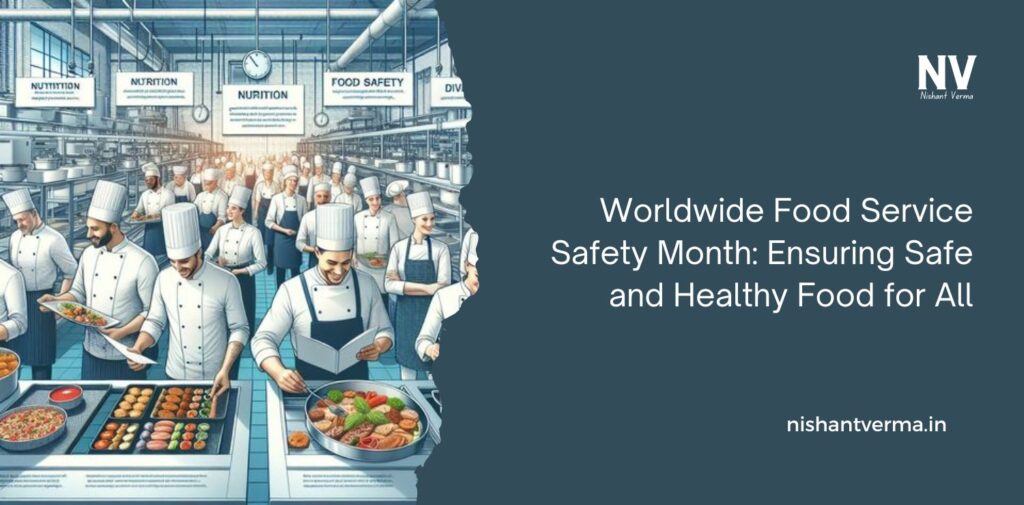Food is an essential part of our daily lives, and it’s something we rely on for nourishment, energy, and joy. However, the safety of the food we eat is just as important as its taste and nutritional value. In countries like India, where food is not only a necessity but also a part of rich traditions, food safety becomes even more critical. This is why Worldwide Food Service Safety Month is observed each year to raise awareness about the importance of food safety in food service operations around the world.
What is Worldwide Food Service Safety Month?
Worldwide Food Service Safety Month is an annual event observed to promote the safety of food in restaurants, hotels, catering businesses, and other food establishments. During this month, attention is focused on food handling, hygiene, and preparation practices that ensure the food served to customers is safe to eat. It’s a time when food service workers, managers, and consumers are encouraged to be more mindful of food safety standards to prevent foodborne illnesses.
In India, food safety issues have always been a concern, especially in crowded cities, street food stalls, and high-volume restaurants. The goal of this observance is to encourage all food service operators, from small eateries to large restaurants, to follow food safety guidelines and maintain high standards of hygiene.

The Importance of Food Safety
Food safety means preventing foodborne illnesses that occur when food is contaminated with harmful bacteria, viruses, or chemicals. These illnesses can cause nausea, vomiting, diarrhea, and other serious health problems. In India, where food is often prepared in large quantities and served to a large number of people, the risks associated with food contamination are even higher. Some of the most common factors that contribute to foodborne illnesses include:
- Improper storage: Storing food at incorrect temperatures can cause bacteria to grow.
- Cross-contamination: Mixing raw food, like meat, with cooked food can spread harmful bacteria.
- Unhygienic practices: Handling food with dirty hands, using unclean utensils, and not washing food thoroughly can lead to contamination.
- Inadequate cooking: Not cooking food to the right temperature can leave harmful pathogens alive.
By following proper food safety practices, we can prevent these risks and ensure that the food we consume is both nutritious and safe.
Key Aspects of Food Safety
To understand what makes food safe, it’s important to know the basic principles of food safety. These principles are applicable to food establishments in India, whether it’s a high-end restaurant or a local dhaba. The four main principles of food safety are:
Cleanliness
One of the most important aspects of food safety is cleanliness. This includes:
- Washing hands regularly: Food handlers must wash their hands before cooking, after using the toilet, and after handling raw food items, such as meat or vegetables.
- Clean surfaces and equipment: All food preparation areas must be regularly cleaned, and cooking utensils should be disinfected. This includes chopping boards, knives, and other tools used in food preparation.
- Personal hygiene: Food service workers should wear clean clothes, cover their hair, and avoid touching their face while handling food.
In India, where street food is a big part of the culture, cleanliness is sometimes overlooked. It’s crucial for street food vendors to maintain clean carts and food preparation areas to avoid contamination.
Proper Storage
Storing food at the right temperature helps to prevent the growth of bacteria. Food must be stored at a cool temperature in refrigerators or freezers, especially items like dairy products, meat, and leftovers. Hot food should also be kept at a safe temperature to prevent harmful microorganisms from growing.
In India, especially during the hot summer months, proper food storage is essential. Not maintaining the right temperature can cause food to spoil quickly, leading to foodborne illnesses. For example, milk and dairy products must be kept refrigerated, and raw meat should be stored separately to prevent cross-contamination.

Avoiding Cross-Contamination
Cross-contamination happens when harmful bacteria from raw food spread to cooked or ready-to-eat food. This can occur when raw meat, eggs, or seafood come into contact with vegetables, fruits, or cooked food.
To avoid cross-contamination:
- Separate raw food from cooked food.
- Use separate cutting boards and knives for raw and cooked items.
- Wash fruits and vegetables thoroughly before eating or cooking.
In India, especially in food preparation settings like kitchens, cross-contamination is a common issue, and more awareness is needed about keeping raw and cooked foods apart.
Cooking to the Right Temperature
Cooking food to the right temperature kills harmful bacteria and ensures that the food is safe to eat. Different foods need to be cooked at different temperatures. For example, meat and poultry should be cooked until there is no pink inside, while eggs should be cooked until the whites and yolks are firm.
In India, where traditional dishes involve cooking food at different heat levels, it’s important to understand that some foods need to be cooked at higher temperatures to be safe for consumption. Whether it’s cooking mutton, poultry, or even rice, ensuring the food reaches the right temperature is essential.

The Role of Food Service Operators in Ensuring Food Safety
In India, food safety is not only the responsibility of the consumer but also of the food service operators, including restaurant owners, chefs, and street food vendors. They must take proactive steps to ensure the safety of the food they serve. Here are some ways food service operators can contribute to food safety:
- Training staff: It’s important to regularly train food handlers on proper food safety practices, including cleaning procedures, handling raw food, and cooking temperatures.
- Regular inspections: Food service establishments should have regular inspections to ensure that hygiene standards are being followed. Local authorities often conduct inspections to make sure that food outlets comply with food safety regulations.
- Adhering to food safety laws: India has a Food Safety and Standards Authority (FSSAI), which sets guidelines for food safety. Food service operators must comply with these standards to ensure the food they serve is safe.
Conclusion
Worldwide Food Service Safety Month is an important reminder for food service operators and consumers alike to pay attention to food safety. By following basic food safety principles like cleanliness, proper storage, avoiding cross-contamination, and cooking food to the right temperature, we can reduce the risk of foodborne illnesses and ensure that food is safe for consumption.
In India, where food plays a vital role in culture and daily life, ensuring food safety is crucial for public health. By observing food safety guidelines and raising awareness during Food Service Safety Month, we can protect ourselves and others from harmful foodborne diseases. Food safety is a shared responsibility, and it starts with the food we serve, the practices we follow, and the care we take in preparing and consuming food.




